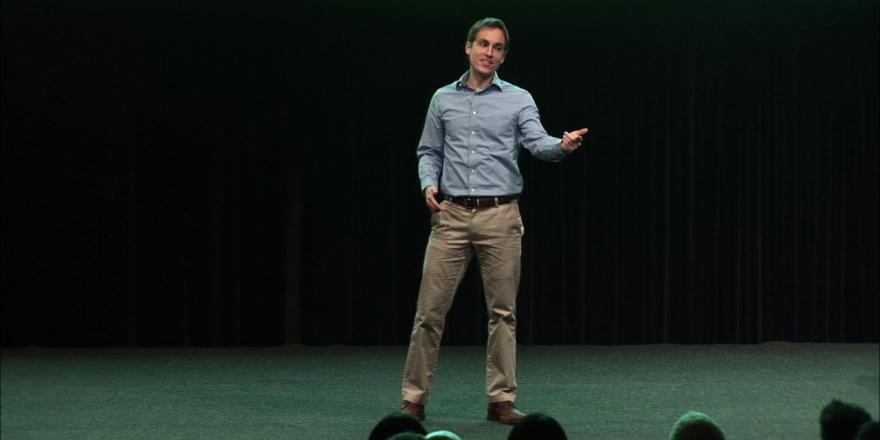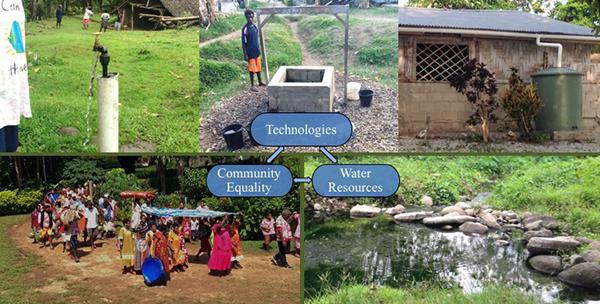Sustaining rural water access under climate change: A Vanuatu case study
Climate change threatens the sustainability of rural water services in Vanuatu. Different disciplines each have their own ways of thinking about this problem and how it should be addressed. They each have their own strengths, but what if they could be combined? This research investigates how different disciplinary perspectives on sustaining rural water access in Vanuatu under climate change can be integrated into a coherent and holistic approach.
Jeremy Kohlitz won the people’s choice award at the UTS 3 Minute Thesis finals for his presentation explaining why we need to bridge disciplinary divides if we are going to address climate change effectively.

The research that I'm presenting today is about bridging different disciplinary perspectives on sustaining water access against climate change especially in developing Pacific Island countries.
Getting clean water at rural parts of small island countries like Vanuatu isn't like what you and I are used to. People may get it from basic piped systems that are managed by community volunteers, they may get it with buckets from wells or they may collect rainwater off rooftops systems.
These can and do meet people's basic needs for water but climate change has far-reaching potential to disrupt them.
How exactly climate change disrupts them depends on who you ask because experts coming from different disciplines have different ways of thinking about this problem. For example, engineers often think about hazards like floods and cyclones and how water technologies can be designed to resist them. Social scientists might point out that the poor have the hardest time adapting to change. They may argue that strategies to strengthen community equality should be used to help them. Meanwhile, an ecologist might bring up that climate change adds stress to ecosystems that provide clean water and may implore that we take action to protect natural water resources.
All of these schools of thought are valid and they're all needed. The problem is that when experts only work from within their own disciplines different approaches sometimes clash. They sometimes miss out on opportunities to synergize and they almost always never see the entire picture.
We can address this problem by getting experts from different disciplines to work closely together but in order to do this, experts coming from different disciplines need a shared way of thinking. We all know how hard it is to understand a field that we're not familiar with and everyone in this competition can appreciate how difficult it is to explain your field to someone who's not an expert in it!
This is where my research comes in. I spent six months in rural areas of Vanuatu studying how people maintain water access from the perspectives of three different disciplines: engineering, sociology and ecology.
This involved surveying physical risks of failure and community water technologies, interviewing community members about political issues in their villages and assessing how climactic variations affect their natural water resources.
From this research, I'm developing a framework that allows experts from these disciplines to understand how their work is linked with other disciplines. In this context, a framework is a way of organizing ideas and concepts to understand how they're connected with one another. So, by using this framework a team of experts would have a quick and easy way of seeing how concepts that they're familiar with are linked with concepts that their teammates are familiar with. What this does is, it allows for easier communication across disciplines which will facilitate more effective integration of ideas.
As a result of this, research interventions to protect access to clean water and rural Vanuatu against climate change will be more coherent, more holistic and therefore more effective. Thank you.
Transcript:
The research that I'm presenting today is about bridging different disciplinary perspectives on sustaining water access against climate change especially in developing Pacific Island countries.
Getting clean water at rural parts of small island countries like Vanuatu isn't like what you and I are used to. People may get it from basic piped systems that are managed by community volunteers, they may get it with buckets from wells or they may collect rainwater off rooftops systems.
Systems like these can and do meet people's basic needs for water but climate change has far-reaching potential to disrupt them.
How exactly climate change disrupts them depends on who you ask because experts coming from different disciplines have different ways of thinking about this problem. For example, engineers often think about hazards like floods and cyclones and how water technologies can be designed to resist them. Social scientists might point out that the poor have the hardest time adapting to change. They may argue that strategies to strengthen community equality should be used to help them. Meanwhile, an ecologist might bring up that climate change adds stress to ecosystems that provide clean water and may implore that we take action to protect natural water resources.
All of these schools of thought are valid and they're all needed. The problem is that when experts only work from within their own disciplines different approaches sometimes clash. They sometimes miss out on opportunities to synergize and they almost always never see the entire picture.
We can address this problem by getting experts from different disciplines to work closely together but in order to do this, experts coming from different disciplines need a shared way of thinking. We all know how hard it is to understand a field that we're not familiar with and everyone in this competition can appreciate how difficult it is to explain your field to someone who's not an expert in it!
This is where my research comes in. I spent six months in rural areas of Vanuatu studying how people maintain water access from the perspectives of three different disciplines: engineering, sociology and ecology.

This involved surveying physical risks of failure and community water technologies, interviewing community members about political issues in their villages and assessing how climactic variations affect their natural water resources.
From this research, I'm developing a framework that allows experts from these disciplines to understand how their work is linked with other disciplines. In this context, a framework is a way of organizing ideas and concepts to understand how they're connected with one another. So, by using this framework a team of experts would have a quick and easy way of seeing how concepts that they're familiar with are linked with concepts that their teammates are familiar with. What this does is, it allows for easier communication across disciplines which will facilitate more effective integration of ideas.
As a result of this, research interventions to protect access to clean water and rural Vanuatu against climate change will be more coherent, more holistic and therefore more effective. Thank you.

